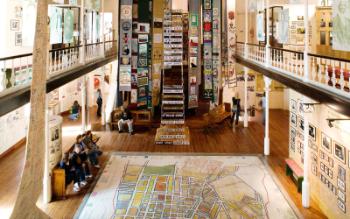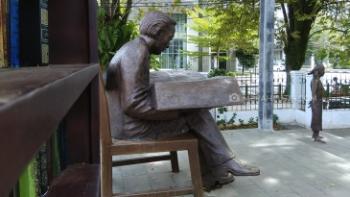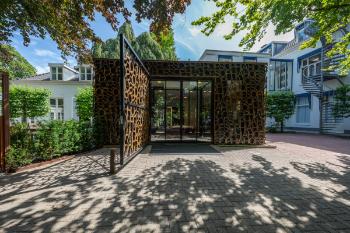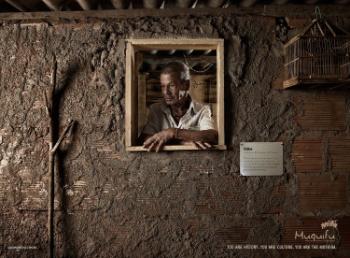Sharing stories on contested histories 2022
Posted on 1 December 2022

“Relations are something that should impact me, and I should change as much as they change” - Prof Wayne Modest
Sitting (virtually) amongst 23 incredible young heritage professionals, students and early career researchers - for which I hope you will indulge me for including myself alongside - I spent two weeks engaging in ‘contested’ conversations through the Cultural Heritage Agency of the Netherlands and the Reinwardt Academy (Amsterdam University of the Arts) 4th international training entitled Sharing Stories on Contested Histories. Splitting into ‘East’ and ‘West’ sessions to best accomodate our time zones, and a time to come together as the whole group for world cafe round tables with all the participants, we had the pleasure of listening to, learning about and discussing complex questions around community, agency, contestation, coloniality and discomfort (to name a few) in the global heritage sector.

Central museum space in District Six Museum, Cape Town, South Africa
At the centre of the training, we engaged with four very different case study museums, chosen and presented in a documentary-style video by alumni of this training: District Six Museum (Cape Town, South Africa), Museum Multatuli (Rangkasbitung, Indonesia), Museum Sophiahof (The Hague, the Netherlands) and Muquifu (Belo Horizonte, Brazil). Split into East 1, East 2, West 3 and West 4 groups, we each took a case study and developed recommendations for the museums’ progress, focussing in particular on questions they had raised in the documentaries, as the magnum opus of our training. My team, West 4 (composed of myself and my incredible teammates from China, Morocco, South Africa and Suriname), addressed the issues of digitisation and ‘reach’ at the District Six Museum, presenting our reflections in a video produced by the very talented Izak Potgeiter.
We were also privileged to listen to not one but two inspiring keynote lectures from Prof Christina Kreps and Prof Wayne Modest on how we decolonise our work. Prof Kreps talked about the use of ‘appropriate museology’, which means our practices should be reactive to what communities value in their heritage. This also requires disabling and disempowering the effects of western bureaucratic systems that define what a museum is - like what conservation and curation actually mean to different communities - to empower people to have greater control over their own heritage.

Statue of Multaluli author, Eduard Douwes Dekker, sitting reading the book, with a character from the book, Saidjah, beckoning visitors to climb the steps leading to Dekker, Museum Multatuli, Indonesia (credit: MP/Suryo)
Prof Modest’s talk instilled a little fear. We realised how much needs to change, the buy-in we need from all our colleagues across the sector to do this, and how much flexibility we need to ask of these people as community work can cause discomfort and requires us all to be entirely open to change. But it also brought hope. Modest argued that community collaboration and plurality, rather than curated exhibitions by ‘professionals’, could be the future of museums. Here, community work becomes 'abolition work' that should aim to undo an institution and its coloniality. We therefore need to figure out how we inhabit practices of togetherness, seeing power exchange not as a loss but as gaining something from exchanges with someone else, which often means stepping aside and showing humility in the face of what is at stake.

Entrance to Museum Sophiahof, The Hague (credit: ASNOVA architecture)
These types of exchanges provide important opportunities for sharing just a fraction of the complex understandings and contexts of heritage across the world. It allowed us to question our own national practices and how they (might and likely do) feed into colonial structures and systems of sustaining relics of our pasts, who has been assigned - self or otherwise - the privilege of weaving the narratives and sharing them, and who we are claiming to serve by protecting and disseminating stories and relics of our pasts. There is still so much work to be done to decolonise this sector, both in Britain and globally, but it can only move forward by having opportunities like these to exchange, critique and discuss change on a global platform.

Campaign for Muquifu Museum (credit: photographer Marco Mendes, Perfil252)
My thanks go out to Cultural Heritage Agency of the Netherlands and the Reinwardt Academy, in particular to Arjen Kok, Ruben Smit, Yulia Dolinina, Hanna Pennock, Dorien Smit and Bibi Silvertant, for selecting me to be part of this and for all of their hard work on hosting and delivering this career-changing training.
Check out AWARE-LA’s resources for advice and toolkits on how to create safe and engaging spaces for these conversations to happen.
Dr Sophie Vohra, Research Associate, National Railway Museum and University of York
